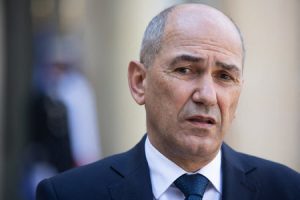8 Jul 2021 | Media Freedom, News and features, Slovenia
[vc_row][vc_column][vc_column_text]

Prime minister of Slovenia Janez Janša
As Slovenia takes over the presidency of the council of the European Union, some are questioning the country’s commitment to one of the bloc’s key principles, that of the freedom of the press.
A new report by Media Freedom Rapid Response (MFRR), a coalition of non-governmental organisations that tracks press freedom in EU Member States, says Slovenia “is no longer a relative safe haven for free media” and that prime minister Janez Janša and the ruling Slovenia Democratic Party (SDS) are “undermining critical journalism, reaching for control of public service media and reshaping the media landscape to boost SDS propaganda channels while pressuring mainstream media”.
The report reveals that journalists in the country are facing rising threats of violence and women journalists in particular are facing misogynistic and sexist insults that have been legitimised by the government’s actions.
Janša, for example, has openly questioned the legitimacy of the Slovenian Press Agency (STA), which covers events in the country, and launched a vicious and completely unfounded attack on Bojan Veselinovic, its director, accusing him of murder.
Janša posted a tweet, a familiar tactic employed by the prime minister to put pressure on opposition voices online, which said: “Amazing for the EU in the 21st century that a collaborator in the murder of a journalist is still leading the STA and therefore cashes in 8,500 euros per month, more than the president of the republic.”
The allegations are unsubstantiated, but the STA is one of many opposition voices that has faced attacks this way.
Meanwhile, investigative journalist Blaž Zgaga, who questioned the government’s Covid-19 response in April, has received multiple death threats.
Slovenia’s 2006 media law is viewed as outdated and offers journalists little protections against smears and political interference.
It is clear there is a combination of the government attempting to change the media narrative, as well as defunding critical voices. It means journalists in the country are facing increasingly difficult circumstances.
The STA had its state funding revoked and will not receive it again unless it submits to direct financial oversight from the government’s communications office (though Slovenian media have since reported that funds are to be given). The move would essentially put the agency under the direct control of government communications.
It is indicative of a strategic ploy by the government to remove state funding from opposition voices, but reward its cheerleaders. The report says that “propaganda outlets parroting the party line are rewarded with lucrative advertising contracts from state institutions and companies”, for example.
Janša’s schemes have been likened to the strategy implemented by Hungarian autocrat prime minister Viktor Orbán, who has faced heavy criticism for his record on free speech, as has the government in Poland. Hungary and Poland are known to be two of the most concerning cases regarding free expression in Europe.
Ties between Janša and Orbán are known to be close, as Anuška Delić, journalist and founder of Oštro, a centre for investigative journalism, wrote in the winter 2020 edition of Index on Censorship magazine.
Motivation for Orbán’s interference in Slovenia is obvious, as he looks for supporting voices in a Europe when there is concern over his actions.
Hungarian funds, with ties to Orbán and his Fidesz party, are being funnelled into pro-SDS media outlets, which, in a country where media revenue is declining and funds are desperately sought, should be of great concern.
The outlook is not entirely bleak, the report said.
“Despite these pressures, the Slovenian independent media sector has proven to be resilient and has continued to display high-quality watchdog journalism during the pandemic. Importantly, support and solidarity between civil society, journalists’ associations and newsrooms has been strong, giving hope for the future of the media landscape in Slovenia.”
Yet not everyone is convinced.
Delić has welcomed the report’s findings, but questioned the notion that media freedom in Slovenia is not as threatened as elsewhere, and said that it will not take much for Slovenia to become the next Poland or Hungary.
“We have just witnessed a new case of meddling where the prime minister asked Val202, a public radio station, on Twitter whether it was true that they played a current protest song on Independence Day,” said Delić, who was consulted by the authors of the report. “On that day one of the speakers at the official celebration was Hungarian Prime Minister Viktor Orbán whose government’s malign influence in Slovenia is clearly portrayed throughout the report.”
As Slovenia takes on the Council presidency, the report’s authors have called on the country’s government to stop the defunding of journalism, amend current media legislation and publicly condemn threats against reporters.[/vc_column_text][/vc_column][/vc_row][vc_row][vc_column][three_column_post title=”You may also like to read” category_id=”8996″][/vc_column][/vc_row]
8 Jul 2021 | Croatia, Monaco, News and features, Statements
[vc_row][vc_column][vc_column_text]

Whistleblower Jonathan Taylor
We are delighted to announce that on Wednesday 7 July 2021, Croatian Justice Minister Ivan Malenica formally rejected the request by Monaco to extradite UK whistleblower Jonathan Taylor. Jonathan Taylor’s Support Group extends its gratitude to the Minister for taking the right decision.
The move comes following sustained calls for the past 11 months from human rights and civil liberties campaigners across Europe – and UK MPs – for his immediate release and safe return home. Legal experts backing the release of Jonathan Taylor said there was no proper legal basis for Monaco to seek Mr. Taylor’s extradition and the process was retaliatory in nature. Lawyers acting on behalf of Jonathan Taylor argued that it constituted an abuse of process.
Jonathan Taylor was arrested whilst on a family holiday in Croatia last July, and has been restrained there since. He has been isolated, away from his family, and unable to support himself or his family, all of which have taken an extreme toll on his mental wellbeing.
A former in-house lawyer for oil firm SBM Offshore based in Monaco, Jonathan Taylor blew the whistle in 2013 on a massive bribery scheme. Jonathan’s whistleblowing disclosures led to SBM Offshore paying over $800 million in fines in the US, Netherlands and Brazil and investigations which led to successful prosecutions of two former CEOs for fraud-related offences.
Yet nine years later, he was arrested on a questionable Interpol Red Notice whilst on holiday, and wanted for questioning in Monaco over allegations made by his former employer over his settlement. The Red Notice was withdrawn by Monaco last December on the eve of Interpol making a determination on its validity. Jonathan denies wrongdoing and his lawyers have long argued there is no legal basis for extraditing him for questioning as he is neither charged nor convicted of any offences.
“I am of course elated that justice has finally prevailed and I am appreciative that Minister of Justice Ivan Malenica was able to pay regard to the salient legal arguments of my lawyers that were seemingly overlooked by the Courts in making his decision to reject Monaco’s flawed attempt at extraditing me,” states Jonathan Taylor.
“Special thanks go to all my supporters in Europe, overseas and in Croatia who somehow kept me sane in my year of need! Be assured that I remain resolute and proud of exposing serious wrongdoing at SBM Offshore and I will never be intimidated by the corrupt and those that shamefully seek retaliation against me for exposing them. I continue to stand ready to assist the Monaco Prosecutor in the event that a decision is made to pursue those responsible for SBM Offshore’s illicit business practices instead of me.”
We agree with Jonathan. The Minister of Justice of Croatia, Ivan Malenica, carefully considered the position of Jonathan Taylor as a whistleblower and a protected witness. His decision in this case has wider implications for the rule of law in Europe: it is a victory for the public’s right to know about wrongdoing by protecting the messengers of that information. Whistleblowers play a vital role in Europe’s fight against global corruption. Croatia has demonstrated its commitment to the rule of law and to the protection of whistleblowers.
We now call on Monaco to drop any further proceedings against Jonathan Taylor and to focus on the actions of SBM Offshore as a proper target for their investigations.
We wish Jonathan a safe return to the UK where he can begin to rebuild his life.
European Centre for Press and Media Freedom (ECPMF)
Whistleblowing International Network (WIN)
Martin Bright, Editor, Index on Censorship (United Kingdom)
Protect (United Kingdom)
Guernica 37 International Justice Chambers (United Kingdom)
Centre for Free Expression (Canada)
Free Press Unlimited
The Government Accountability Project (USA)
ARTICLE 19
The Platform to Protect Whistleblowers in Africa (PPLAAF)
Transparency International EU
The Daphne Caruana Galizia Foundation (Malta)
Pištaljka (Serbia)
Blueprint for Free Speech (Germany and Australia)
The Signals Network (USA/France)
Transparency International – Bulgaria
Transparency International Italy
SpeakOut SpeakUp Ltd
European Organisation of Military Associations and Trade Unions (EUROMIL)
Transparency International Secretariat
Access Info Europe
GlobaLeaks
European Federation of Journalists (EFJ)
Eurocadres – Council of European Professional & Managerial Staff
Professor David Lewis, Middlesex University (UK)
Osservatorio Balcani Caucaso Transeuropa (OBCT)
Sherpa (France)
WhistleblowersUK
Baroness Kramer, Co-Chair of the All Party Parliamentary Group on Whistleblowing (UK)
Mary Robinson MP, Co-Chair of the All Party Parliamentary Group on Whistleblowing (UK)[/vc_column_text][/vc_column][/vc_row]
6 Jul 2021 | Events
[vc_row][vc_column][vc_single_image image=”117041″ img_size=”large”][vc_column_text]
Every time a European university pressures an academic to temper their criticism of the Chinese Communist Party (CCP), every time a filmmaker opts to amend their film to avoid offending the Chinese authorities, and every time a Chinese citizen living in Europe self-censors in an effort to protect themselves or their families in China, the CCP is effectively censoring Europe.
This virtual event will explore the extent to which the CCP is exploiting its growing influence in order to erode freedom of expression in Europe, and will look at what needs to be done to protect our fundamental rights and our democracy.
Speakers:
Mareike Ohlberg, China analyst and co-author of Hidden Hand: How the Chinese Communist Party is Reshaping the World
Tom Tugendhat MP, Chairman of the UK’s Foreign Affairs Select Committee
Edward Lucas, journalist and editor of the China Influence Monitor
Trevor Phillips, chair of Index on Censorship (event chair)
Register for tickets here.[/vc_column_text][/vc_column][/vc_row][vc_row][vc_column][/vc_column][/vc_row][vc_row][vc_column][vc_column_text][/vc_column_text][/vc_column][/vc_row]
5 Jul 2021 | Belarus, News and features, Statements
[vc_row][vc_column][vc_column_text]

Andrei Aliaksandrau
Human rights organisations will today urge UN Human Rights Council Member States to maintain explicit calls for the immediate and unconditional release of Belarusian journalist and human rights defender Andrei Aliaksandrau, who is now facing up to 15 years in prison on baseless charges of “treason to the state”.
Aliaksandrau has long been a defender of freedom of expression in Belarus and beyond, having previously held positions at Index on Censorship and ARTICLE 19, among other media and free speech organisations. He was detained on 12 January 2021, along with his partner, Irina Zlobina and has remained in detention since then.
The charges against Aliaksandrau and Zlobina stem from allegations that they paid the fines of journalists and protesters whom authorities detained during last year’s pro-democracy protests, part of a concerning trend by Belarusian authorities to use the imposition of new legislation to severely limit freedoms of assembly, association, and expression. To date, only Aliaksandrau has been charged with treason.
“The regime has begun to impose tougher charges on those in pre-trial detention to further suppress dissent,” ARTICLE 19 will tell the UN Human Rights Council today. “Andrei Aliaksandrau, a journalist who has been behind bars since January, has recently seen his charges related to public order escalate to more severe charges of high treason under Article 356 of the Belarus Criminal Code.”
“[W]e are gravely concerned for journalist and media manager Andrei Aliaksandrau,” Human Rights House Foundation will tell the UN Human Rights Council. “We call for his immediate release and exoneration.”
The calls from international civil society are part of an Interactive Dialogue at the HRC with the UN Special Rapporteur on the situation of human rights in Belarus, Anaïs Marin. This formal agenda item follows submission of the Special Rapporteur’s regular reporting to the Council. In her report, the Special Rapporteur notes that “several human rights defenders and activists are currently imprisoned for having provided, through their organizations, charity support to persons detained during the post-electoral crackdown in the form of legal assistance or solidarity funds to pay for fines.”
The Special Rapporteur has reported regularly to the Council since the mandate was created in 2012 in response to “the existence of a pattern of serious violations of human rights […] that is of a systemic nature.” The arrest and detention of Aliaksandrau is another example of this pattern and follows the death on 21 May 2021 of political prisoner Vitold Ashurak while incarcerated by the authorities for doing legitimate human rights work.
For more information please contact:
Jessica Ni Mhainin, Policy and Campaigns Manager, Index on Censorship: [email protected]
Dave Elseroad, Head of Advocacy, Human Rights House Foundation: [email protected], +41 78 344 36 18
Joanna Szymanska, Senior Programme Officer for Europe and Central Asia, ARTICLE 19: [email protected] [/vc_column_text][/vc_column][/vc_row]



